Big Tech faced tough questions Tuesday as federal lawmakers focused on issues of potentially anticompetitive behavior by technology giants and expressed bipartisan skepticism over Facebook's plan for a new digital currency.
Companies such as Apple, Google, Facebook and Amazon have long enjoyed nearly unbridled growth and a mythic stature as once-scrappy startups — born in garages and a dorm room and a road trip across the United States — that grew up to dominate their rivals. But as they've grown more powerful, critics have also grown louder, questioning whether the companies stifle competition and innovation, and if their influence poses a danger to society.
Click to Gallery
Big Tech faced tough questions Tuesday as federal lawmakers focused on issues of potentially anticompetitive behavior by technology giants and expressed bipartisan skepticism over Facebook's plan for a new digital currency.
An afternoon panel of the House Judiciary Committee focused on whether it's time for Congress to rein in these companies, which are among the largest on Earth by several measures. Central to that case is whether their business practices run afoul of century-old laws originally designed to combat railroad and oil monopolies.
A panel of four mid-level executives from the companies countered that their firms continue to innovate, that they face vigorous competition on all fronts — including from one another — and, perhaps most of all, that they were not monopolists in any way, shape or form.
"We have a word for that and that word is monopoly, or at least monopoly power," Neguse said.
Sutton said the company doesn't use third-party sellers' data to "directly compete" with them. Cicilline, affecting disbelief, twice reminded Sutton that he was under oath. "Amazon is a trillion-dollar company that runs an online platform with real-time data," he said.
Others, mostly Republicans, rejected what they described as a big-is-bad approach in favor of keeping antitrust enforcers narrowly focused on protecting consumers when there's clear evidence of harm such as price gouging.
"Facebook is dangerous," asserted Sen. Sherrod Brown of Ohio, the committee's senior Democrat. Like a toddler playing with matches, "Facebook has burned down the house over and over," he told Marcus. "Do you really think people should trust you with their bank accounts and their money?"
Google Director of Economic Policy Adam Cohen testifies alongside Facebook Head of Global Policy Development Matt Perault, back center, and Amazon Associate General Counsel Nate Sutton, back right, during a House Judiciary subcommittee hearing, Tuesday, July 16, 2019, on Capitol Hill in Washington. (AP PhotoPatrick Semansky)
Google Director of Economic Policy Adam Cohen, left, testifies alongside Facebook Head of Global Policy Development Matt Perault, second from left, Amazon Associate General Counsel Nate Sutton and Apple Vice President for Corporate Law and Chief Compliance Officer Kyle Andeer during a House Judiciary subcommittee hearing, Tuesday, July 16, 2019, on Capitol Hill in Washington. (AP PhotoPatrick Semansky)
Google Director of Economic Policy Adam Cohen testifies during a House Judiciary subcommittee hearing, Tuesday, July 16, 2019, on Capitol Hill in Washington. (AP PhotoPatrick Semansky)
Amazon Associate General Counsel Nate Sutton testifies during a House Judiciary subcommittee hearing, Tuesday, July 16, 2019, on Capitol Hill in Washington. (AP PhotoPatrick Semansky)
Both Democrats and Republicans had grievances to air, even if there wasn't much consensus on what to do about them.
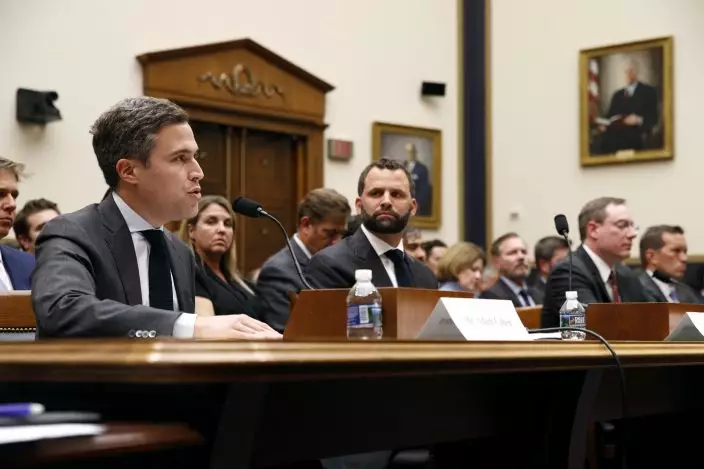
Google Director of Economic Policy Adam Cohen, left, testifies during a House Judiciary subcommittee hearing, Tuesday, July 16, 2019, on Capitol Hill in Washington. (AP PhotoPatrick Semansky)
An afternoon panel of the House Judiciary Committee focused on whether it's time for Congress to rein in these companies, which are among the largest on Earth by several measures. Central to that case is whether their business practices run afoul of century-old laws originally designed to combat railroad and oil monopolies.
For some legislators, mostly Democrats, those laws are in need of updates or at least more stringent enforcement. Ultimately such action could lead to breaking up big online platforms, blocking future acquisitions or imposing other limits on their actions.
Subcommittee chairman David Cicilline, a Rhode Island Democrat, charged that technology giants had enjoyed "de facto immunity" thanks to current antitrust doctrine, which typically equates anticompetitive behavior with higher prices for consumers. That allowed them to expand without restraint and to gobble up potential competitors, he argued, creating a "startup kill zone" that prevents smaller companies from challenging incumbents with innovative services and technology.
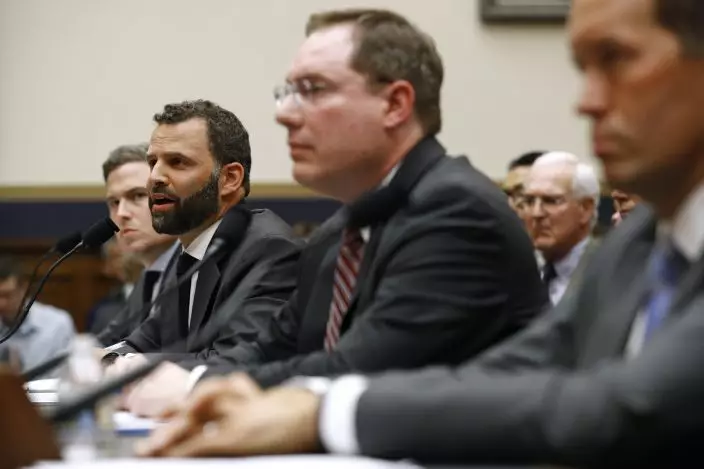
Facebook Head of Global Policy Development Matt Perault, second from left, testifies alongside Google Director of Economic Policy Adam Cohen, back left, Amazon Associate General Counsel Nate Sutton, second from right, and Apple Vice President for Corporate Law and Chief Compliance Officer Kyle Andeer during a House Judiciary subcommittee hearing, Tuesday, July 16, 2019, on Capitol Hill in Washington. (AP PhotoPatrick Semansky)
A panel of four mid-level executives from the companies countered that their firms continue to innovate, that they face vigorous competition on all fronts — including from one another — and, perhaps most of all, that they were not monopolists in any way, shape or form.
Facebook, for instance, has argued that it is not a monopoly because it has many competitors in businesses as diverse as private messaging, photo sharing and online advertising.
So Democratic Rep. Joe Neguse of Colorado asked Facebook's head of global policy development, Matt Perault, to name the world's largest social network by active users. (It is Facebook.) When Perault said he couldn't, Neguse ticked off four of the six largest — Facebook, Facebook Messenger, Instagram and WhatsApp — and had Perault verify that all are owned by Facebook.
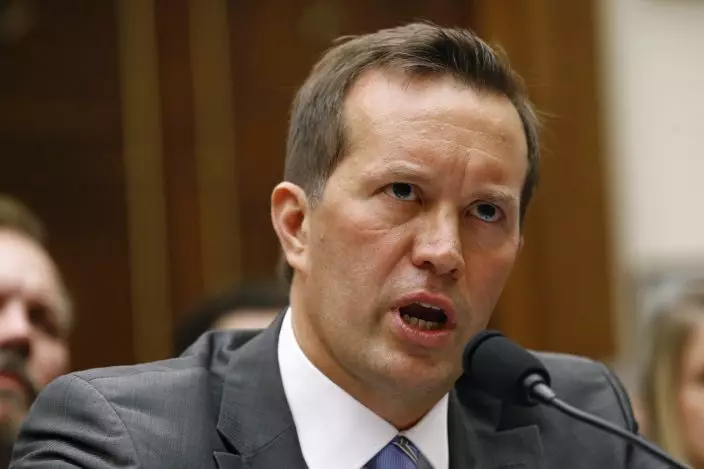
Apple Vice President for Corporate Law and Chief Compliance Officer Kyle Andeer testifies during a House Judiciary subcommittee hearing, Tuesday, July 16, 2019, on Capitol Hill in Washington. (AP PhotoPatrick Semansky)
"We have a word for that and that word is monopoly, or at least monopoly power," Neguse said.
The company representatives didn't help their case by pleading ignorance on multiple occasions. Google's director of economic policy, Adam Cohen, said he was "not familiar" with how much Google pays Apple for the right to supply the default search engine for Safari on iPhones. (Rep. Jamie Raskin, a Democrat from Maryland, said It was $9 billion in 2018 and $12 billion in 2019.) Cohen also said he was "not familiar" with allegations of widespread fraudulent listings on Google Maps.
Amazon also faced some pointed questioning. Cicilline asked Nate Sutton, an associate general counsel at the online retailer, whether it uses the data it collects about popular products to direct consumers to Amazon's own in-house products.
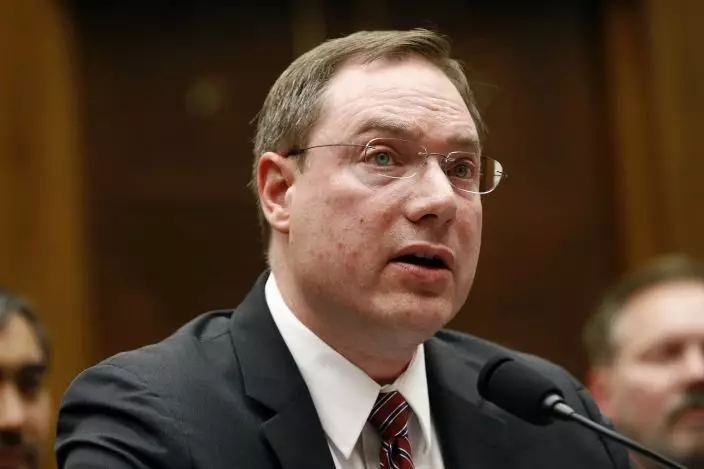
Amazon Associate General Counsel Nate Sutton testifies during a House Judiciary subcommittee hearing, Tuesday, July 16, 2019, on Capitol Hill in Washington. (AP PhotoPatrick Semansky)
Sutton said the company doesn't use third-party sellers' data to "directly compete" with them. Cicilline, affecting disbelief, twice reminded Sutton that he was under oath. "Amazon is a trillion-dollar company that runs an online platform with real-time data," he said.
Expert witnesses suggested it might be time to reassess antitrust policy. Timothy Wu, a law professor at Columbia University who has advocated for more expansive antitrust enforcement, noted concerns about a fall in the number of startups being formed, and wondered aloud whether the U.S. will remain a place where startups thrive and launch new industries.
Fiona Scott Morton, a Yale economics professor, argued that stifled competition has hampered innovation and hurt both smaller businesses and consumers, who have no choice but to surrender their privacy and watch more advertising.
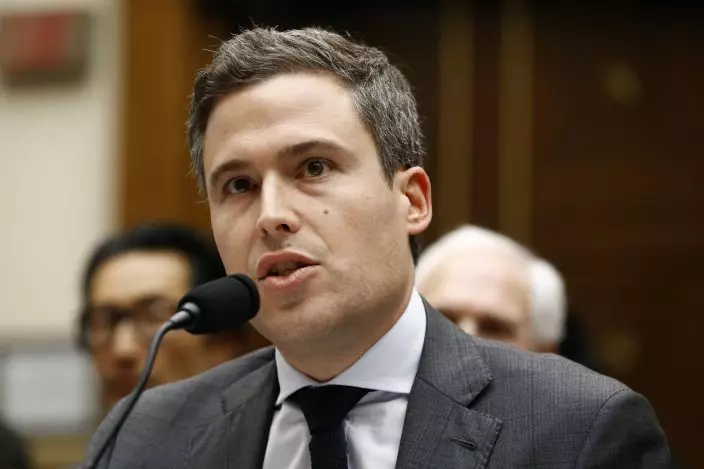
Google Director of Economic Policy Adam Cohen testifies during a House Judiciary subcommittee hearing, Tuesday, July 16, 2019, on Capitol Hill in Washington. (AP PhotoPatrick Semansky)
Others, mostly Republicans, rejected what they described as a big-is-bad approach in favor of keeping antitrust enforcers narrowly focused on protecting consumers when there's clear evidence of harm such as price gouging.
Attorney Maureen Ohlhausen, a former Republican commissioner and acting chairwoman of the Federal Trade Commission, said the government can still protect against anticompetitive behavior without "reducing the focus on consumer welfare." She warned against "drastic" steps such as breakups that carry "serious risk of doing more harm than good for competition and consumers."
Earlier in the day, a Facebook executive appeared before a Senate panel to defend the company's ambitious plan to create a digital currency and pledged to work with regulators to achieve a system that protects the privacy of users' data. David Marcus, who leads the Libra project, faced sharp criticism from both Democrats and Republicans.
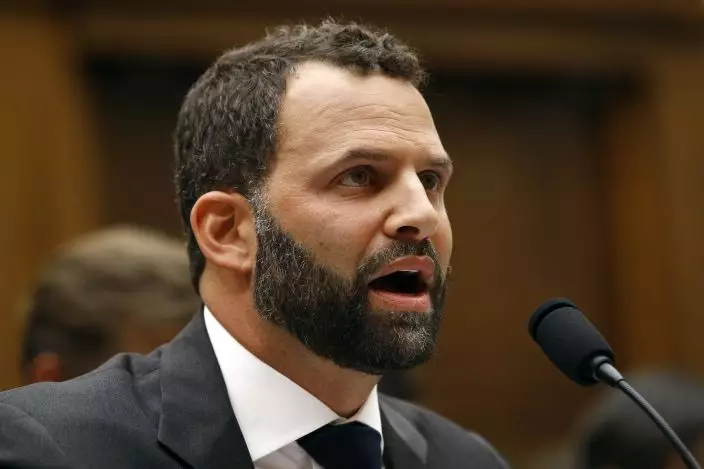
Facebook Head of Global Policy Development Matt Perault testifies during a House Judiciary subcommittee hearing, Tuesday, July 16, 2019, on Capitol Hill in Washington. (AP PhotoPatrick Semansky)
"Facebook is dangerous," asserted Sen. Sherrod Brown of Ohio, the committee's senior Democrat. Like a toddler playing with matches, "Facebook has burned down the house over and over," he told Marcus. "Do you really think people should trust you with their bank accounts and their money?"
Republican Sen. Martha McSally of Arizona said "the core issue here is trust." Users won't be able to opt out of providing their personal data when joining the new digital wallet for Libra, McSally said.
AP business writer Marcy Gordon contributed to this article from Washington, D.C.
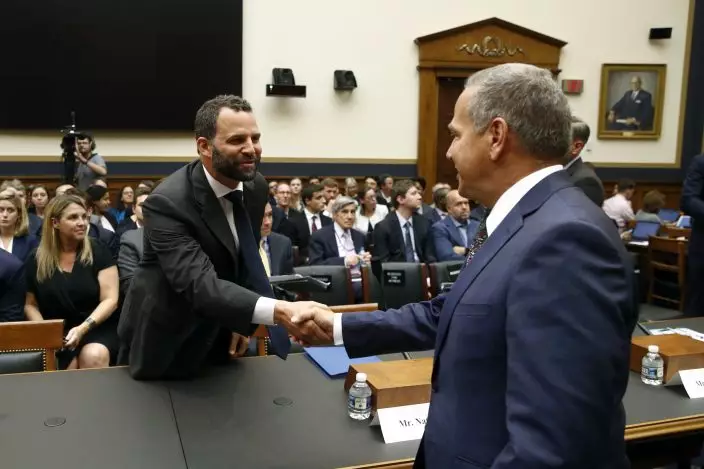
Facebook Head of Global Policy Development Matt Perault, left, shakes hands with Rep. David Cicilline, D-R.I., chair of the House Judiciary antitrust subcommittee, before testifying at a hearing, Tuesday, July 16, 2019, on Capitol Hill in Washington. (AP PhotoPatrick Semansky)
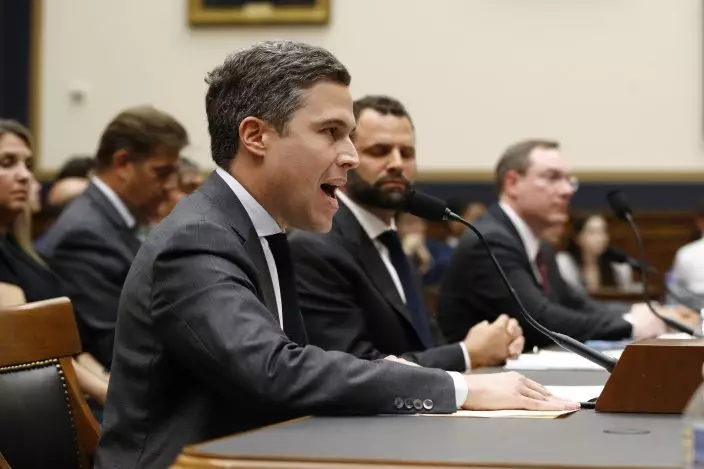
Google Director of Economic Policy Adam Cohen testifies alongside Facebook Head of Global Policy Development Matt Perault, back center, and Amazon Associate General Counsel Nate Sutton, back right, during a House Judiciary subcommittee hearing, Tuesday, July 16, 2019, on Capitol Hill in Washington. (AP PhotoPatrick Semansky)

Google Director of Economic Policy Adam Cohen, left, testifies alongside Facebook Head of Global Policy Development Matt Perault, second from left, Amazon Associate General Counsel Nate Sutton and Apple Vice President for Corporate Law and Chief Compliance Officer Kyle Andeer during a House Judiciary subcommittee hearing, Tuesday, July 16, 2019, on Capitol Hill in Washington. (AP PhotoPatrick Semansky)
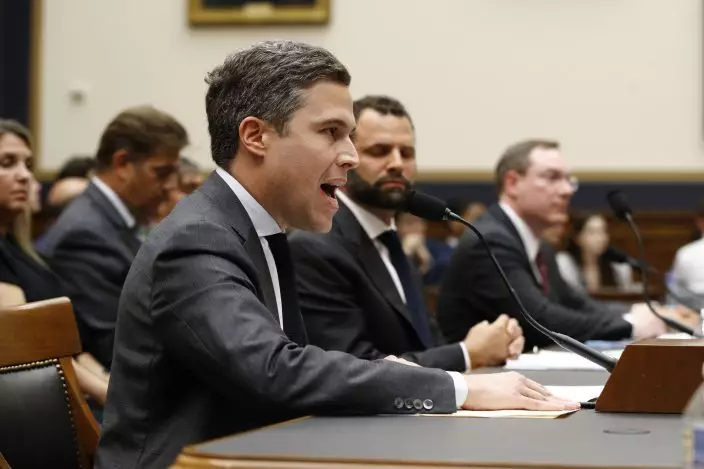
Google Director of Economic Policy Adam Cohen testifies during a House Judiciary subcommittee hearing, Tuesday, July 16, 2019, on Capitol Hill in Washington. (AP PhotoPatrick Semansky)
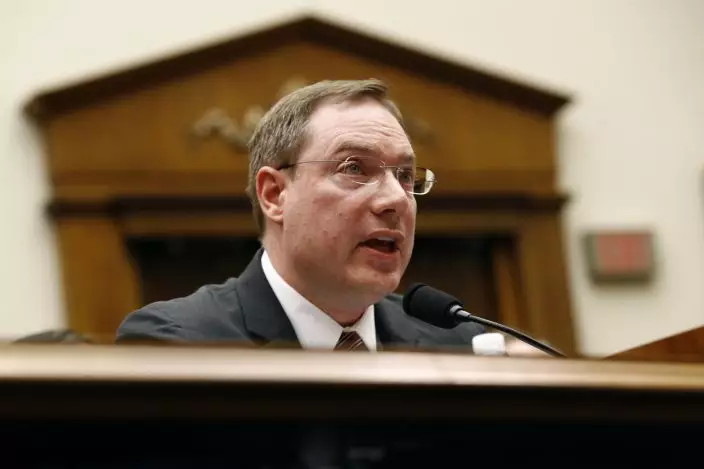
Amazon Associate General Counsel Nate Sutton testifies during a House Judiciary subcommittee hearing, Tuesday, July 16, 2019, on Capitol Hill in Washington. (AP PhotoPatrick Semansky)
KYIV, Ukraine (AP) — A big, new package of U.S. military aid will help Ukraine avoid defeat in its war with Russia. Winning will still be a long slog.
The arms and ammunition in the $61 billion military aid package should enable Ukraine to slow the Russian army's bloody advances and block its strikes on troops and civilians. And it will buy Ukraine time — for long-term planning about how to take back the fifth of the country now under Russian control.
“Ultimately it offers Ukraine the prospect of staying in the war this year,” said Michael Clarke, visiting professor in war studies at King’s College London. “Sometimes in warfare you’ve just got to stay in it. You’ve just got to avoid being rolled over.”
The U.S. House of Representatives approved the package on Saturday after months of delays by some Republicans wary of U.S. involvement overseas. It was passed by the Senate on Tuesday, and President Joe Bidensigned it into law on Wednesday.
The difference could be felt within days on the front line in eastern and southern Ukraine, where Russia’s much larger army has been slowly taking territory against massively outgunned Ukrainian forces.
The aid approval means Ukraine may be able to release artillery ammunition from dwindling stocks that it has been rationing. More equipment will come soon from American stocks in Poland and Germany, and later from the U.S.
The first shipments are expected to arrive by the beginning of next week, said Davyd Arakhamia, a lawmaker with Ukrainian President Volodymyr Zelenskyy’s Servant of the People party.
But opposition lawmaker Vadym Ivchenko, a member of the Ukrainian parliament’s National Security, Defense and Intelligence Committee, said logistical challenges and bureaucracy could delay shipments to Ukraine by two to three months, and it would be even longer before they reach the front line.
While details of the shipments are classified, Ukraine’s most urgent needs are artillery shells to stop Russian troops from advancing, and anti-aircraft missiles to protect people and infrastructure from missiles, drones and bombs.
What’s coming first is not always what front-line commanders need most, said Arakhamia, the Ukrainian lawmaker. He said that even a military giant like the U.S. does not have stockpiles of everything.
“The logic behind this first package was, you (the U.S.) finds our top priorities and then you see what you have in the warehouses,” Arakhamia said. “And sometimes they do not match.”
Hope for future breakthroughs for Ukraine still hangs on more timely deliveries of Western aid, lawmakers acknowledge.
Many experts believe that both Ukraine and Russia are exhausted by two years of war and won’t be able to mount a major offensive — one capable of making big strategic gains — until next year.
Still, Russia is pushing forward at several points along the 1,000-kilometer (600-mile) front, using tanks, wave after wave of infantry troops and satellite-guided gliding bombs to pummel Ukrainian forces. Russia is also hitting power plants and pounding Ukraine’s second-largest city, Kharkiv, which is only about 30 kilometers (some 20 miles) from the Russian border.
Ivchenko said the goal for Ukraine’s forces now is to “hold the line” until the bulk of new supplies arrive by mid-summer. Then, they can focus on trying to recapture territory recently lost in the Donetsk region.
“And probably ... at the end of summer we’ll see some movement, offensive movement of the Ukrainian armed forces,” he said.
Some military experts doubt Ukraine has the resources to mount even small offensives very soon.
The U.S. funding “can probably only help stabilize the Ukrainian position for this year and begin preparations for operations in 2025,” said Matthew Savill, director of military sciences at the Royal United Services Institute, a think tank.
In the best-case scenario for Ukraine, the American aid will give commanders time to reorganize and train its army — applying lessons learned from its failed summer 2023 offensive. It may also galvanize Ukraine’s allies in Europe to increase aid.
“So this just wasn’t about Ukraine and the United States, this really affected our entire 51-country coalition,” said U.S. Congressman Bill Keating, a Democrat who visited Kyiv on Monday as part of a four-member congressional delegation.
Zelenskyy insists Ukraine's war aim is to recapture all its territory from Russia — including Crimea, seized illegally in 2014. Even if the war ultimately ends through negotiation, as many experts believe, Ukraine wants to do that from as strong a position as possible.
Whatever happens on the battlefield, Ukraine still faces variables beyond its control.
Former U.S. President Donald Trump, who seeks to retake the White House in the November election, has said he would end the war within days of taking office. And the 27-nation Europe Union includes leaders like Hungarian Prime Minister Viktor Orbán and Slovak Prime Minister Robert Fico, who have opposed arming Ukraine.
Ukraine’s allies have held back from supplying some arms out of concern about escalation or depleting their own stocks. Ukraine says that to win the war it needs longer-range missiles it could use for potentially game-changing operations such as cutting off occupied Crimea, where's Russia's Black Sea fleet is based.
Ukraine especially wants a longer-range version of Army Tactical Missile Systems, known as ATACMS, from the U.S., along with Taurus cruise missiles from Germany. Both governments have resisted calls to send them because they are capable of striking targets deep within Russian territory.
The new bill authorizes Biden to send Ukraine ATACMS that have a range of some 300 kilometers (190 miles) “as soon as practicable.”
On Wednesday, American officials revealed that the U.S. already secretly transferred a number of the longer-range missiles to Ukraine last month, and they were used for the first time last week to strike an airfield in occupied Crimea. The officials spoke on condition of anonymity to discuss the delivery before it became public.
Meanwhile, Russia is using its advantage in troops and weapons to push back Ukrainian forces, perhaps seeking to make maximum gains before Ukraine's new supplies arrive.
For weeks it has pummeled the small eastern city of Chasiv Yar, suffering heavy losses. Britain's Ministry of Defense says 900 Russian troops are being killed or injured a day in the war.
Capturing the strategically important hill town would allow them to move toward Sloviansk and Kramatorsk, key cities Ukraine controls in the eastern region of Donetsk. It would be a significant win for Russian President Vladimir Putin, who Western officials say is bent on toppling Ukraine’s pro-Western government.
Russian pressure was aimed not just at gaining territory, but on undermining Zelenskyy and bolstering critics who say his war plan is failing, said Clarke of King's College London.
The U.S. aid package decreases the likelihood of a political crisis in Ukraine, and U.S. Speaker Mike Johnson deserves credit for pushing it through Congress, he said.
"He held history in his hands,” Clarke said.
This story has been updated to correct Orbán's title, the Slovak prime minister's name and that the British estimate of daily Russian losses is for the war, not one battle.
Associated Press writers Lolita C. Baldor and Tara Copp contributed from Washgington.
Follow AP’s coverage of the war in Ukraine at https://apnews.com/hub/russia-ukraine

From left, U.S. representatives Nathaniel Moran, R-Tx, Tom Kean Jr, R-NJ, Bill Keating, D-Mass, and Madeleine Deane, D-Pa, talk to journalists during a joint news conference outside Saint Michael cathedral in Kyiv, Ukraine, Monday, April 22, 2024. A newly approved package of $61 billion in U.S. aid may prevent Ukraine from losing its war against Russia. But winning it will be a long slog. (AP Photo/Francisco Seco)

A volunteer makes a camouflage net at a facility producing material for Ukrainian soldiers in Kyiv, Ukraine, Monday, April 22, 2024. A newly approved package of $61 billion in U.S. aid may prevent Ukraine from losing its war against Russia. But winning it will be a long slog. (AP Photo/Francisco Seco)

Davyd Arakhamia, a lawmaker with Ukrainian President Volodymyr Zelenskyy's Servant of the People party, talks during an interview with Associated Press in Kyiv, Ukraine, Monday, April 22, 2024. (AP Photo/Francisco Seco)

A woman rallies to raise awareness on the fate of Ukrainian prisoners of war in Kyiv, Ukraine, Sunday, April 21, 2024. (AP Photo/Francisco Seco)

Ribbons with the colors of the European Union and Ukraine are attached to a tree next to memorial wall of Ukrainian soldiers killed during the war in Kyiv, Ukraine, Monday, April 22, 2024. (AP Photo/Francisco Seco)

The body of a woman killed by Russian bombardment in Chernihiv, Ukraine, Wednesday, April 17, 2024. (AP Photo/Francisco Seco)

Soldiers carry the coffins of two Ukrainian army sergeants during their funeral in Lviv, Ukraine, Tuesday, April 16, 2024. (AP Photo/Francisco Seco)



























